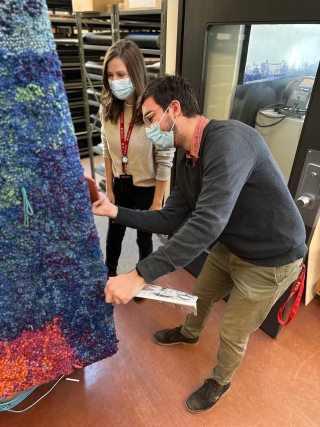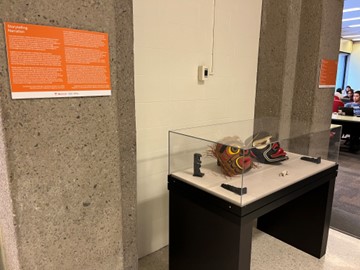The McGill Visual Arts Collection (VAC) team cares for over 3,500 works of art spread across three campuses in more than 90 McGill buildings. While art museums tend to only have a small fraction of their collection on view, McGill has nearly 80% of its collection on display, which enhances the teaching, research, and working environments of faculty, staff, students, and visitors.
To appreciate these works of art, no appointment or reservation is needed! Just walk through the Milton Gates and you will come across examples of 20th century abstract sculptures in the James Sculpture Garden. You can learn about First Nations masks on the fifth floor of the Bronfman building, marvel at Inuit sculptures in the Gelber Law Library, or even explore the VAC’s virtual tour to view works by Indigenous artists.
Artwork inspection surveys

Caring for McGill’s art collection takes time and commitment. Since 2013, McGill staff and student interns of the VAC have conducted regular campus-wide surveys of McGill University’s art collection. These surveys verify the current condition of the works of art through an in-depth visual inspection and includes a comparison to their previous condition. In addition to the visual inspection, the VAC team assesses if the work of art’s current location is still safe and appropriate – they consider whether the room is being used in a different way and whether renovations are being planned in the area. If any changes are needed, the VAC team is responsible for arranging the re-location.
The VAC’s 2023 survey is already underway, and you can expect to see the VAC team on campus checking works of art while armed with clipboards, cameras, and measuring tapes.
Reminders
In collaboration with the VAC team, Risk Advisory and Insurance Services offers you some reminders on how you can help preserve our collection:
- Keep an eye out for nearby open windows during extreme temperature fluctuations. Considering that excessive heat and extreme cold can lead to deterioration, try to ensure that works of art are subject to stable temperature and humidity levels.
- Free-standing objects, such as floor lamps and ladders, should remain a safe distance from works of art.
- The removal, cleaning, or re-location of works of art should be completed by trained staff. This is particularly important during office renovations, construction projects and other types of events, including water damage incidents, which all have an impact on your space. If you have works of art in your office that you believe require attention, please vacollection [at] mcgill.ca (email the VAC team).
 Storytelling Indigenous Art Display in McLennan Library Lobby, Curated by Catie Galbraith, Indigenous Art Intern, 2022. McGill Visual Arts Collection.
Storytelling Indigenous Art Display in McLennan Library Lobby, Curated by Catie Galbraith, Indigenous Art Intern, 2022. McGill Visual Arts Collection. - If you would like to enjoy some new artwork or to replace existing artwork in your McGill office or department space, you can submit a request through the VAC team’s Campus Loan program. The VAC team does not charge for art loans. However, for the Campus Loan Program to remain sustainable, borrowers cover the fees for transport and installation of newly borrowed works, transport of returned works, and/or re-installation of works needing to be moved.
Report an issue
If you see McGill-owned works of art that have suffered damage due to a flood, fire or if there has been a theft, please report the issue to all three units below:
- Security Services:
Downtown campus, dial 514-398-3000
Macdonald campus, dial 514-398-7777 - Risk Advisory and Insurance Services
supportrisk.insurance [at] mcgill.ca
Include a copy of the Security Incident Report - Visual Arts Collection
As a risk analyst at McGill since 2005, Melissa Ng Wan deals with assessing and preventing potential risk exposures to ensure the safety and security of the university community through insurance and other risk transfer methods.
Risk Advisory and Insurance Services (RAIS) promotes and advances the use of risk management practices in order to protect McGill University's human and physical resources against potential loss and minimize the adverse affects should a loss occur. From research involving animals, cells and rockets, to teaching medicine, music and law, to building operation, maintenance and renovation, what goes on at a university can be a risky business. Prevention plays an essential part in the management of these risks. RAIS is happy to bring you this series of important prevention reminders to help minimize the risk of loss and damages.